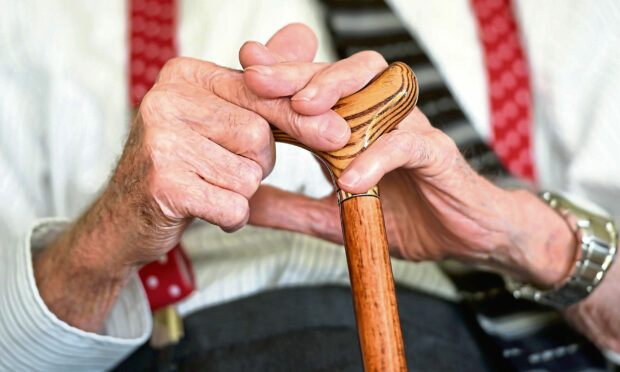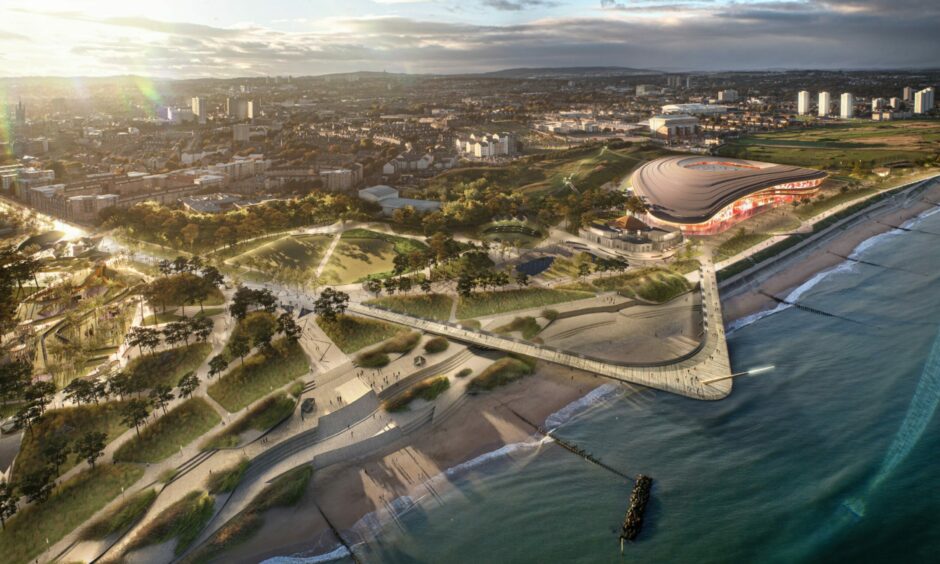Sir, – Sometimes you get a bee in your bonnet that just won’t stop buzzing.
My one went into overdrive when reading the heading in The P&J (November 30) “Worst-ever staffing crisis at care homes”, with many unfilled vacancies and staff in post being enticed to leave by the financial “riches” on offer in retail and hospitality.
No real surprise but why has this developed? With many residents paying substantial amounts for their care it is disgraceful that more can be earned stacking shelves in a supermarket or serving in a pub.
A new national care service being considered by MSPs to be delivered by 2026 is bedevilled by lack of detail and questions over funding (surprise, surprise).
What should be looked at is installing in the care sector a career structure equivalent to that of a nurse in the NHS with similar remuneration and status.
What is the difference between the daily tasks of a nurse in a geriatric ward in hospital and a carer in a residential home?
For far too long those who care for the old and frail have been undervalued, an occupation for those who couldn’t find, or were incapable of, something better. So little has changed since the early 1940s when I observed my paternal granny suffering from the symptoms of dementia, being cared for by an aunt – not praised because she uncomplainingly looked after her mother.
But within the family, it was considered all she was capable of achieving.
At the height of the Covid pandemic, we put rainbows in our windows and rightly applauded the work of those in our hospitals caring for our loved ones held captive by the disease.
But there was not a mention of the staff in care homes performing the same tasks for those similarly affected in their care.
They are indeed nurses without equivalent salary and status.
Until this disparity is addressed the sector will continue to struggle with recruitment especially with the reduced pool of foreign nationals willing to “work for sweeties”.
Ivan W. Reid, Kirkburn, Laurencekirk.
Politically-expedient Union Street U-turn?
Sir, – As someone who has voted for Ian Yuill more than once, I was shocked that he stood for the pedestrianisation of Union Street before the council elections, then immediately reversed that position once in power.
I expect he’d explain that his position was always contingent upon equal access for people with limited mobility.
I had naively assumed that access to a short, flat, pedestrianised area would not be an issue because every other town in the UK seems to have found a workable compromise.
After all, Buchanan Street, the poster-child for Scottish retail, is three times longer and on a hill. Would it be cynical to suggest the access issue was just a politically-expedient get-out clause?
Arguably, it was the trend to new shopping malls that sucked the life out of Union Street, but at least it remains.
It was always a main thoroughfare and perhaps it always should be.
Certainly, from my father’s tales of how much he enjoyed himself before I was born, the old bus and tram layout seemed to work just fine. So perhaps it was the right decision for the wrong reasons.
Regarding public funding for a new AFC stadium by the beach, I do agree with Ian on that. Football clubs are businesses, they can go bankrupt or get bought out.
Can you imagine if the stadium ended up wholly owned by, say, the Trump empire?
Best not to. If a new stadium is to be part-funded by the city it should be owned by the city and leased to AFC, not the other way around.
I’m sure a merchant banker could put together a suitable package.
I’m not convinced about that stadium anyway. More than 10,000 people attended the beach fireworks on a dreich November evening and the only way to handle the crowds is widespread road closures.
I’m not sure what having twice as many football fans walking into town would be like. Welcomed by some in the hospitality sector, perhaps, but feared by others, who would close for the day. The area would be a no-go on match days as far as I’m concerned.
I share Rebecca Buchan’s recent opinion column frustration with Aberdeen’s resistance to change. I am also rather proud of it. I’m Aberdonian but I spent most of my working life in England.
I had great fun recently showing an old colleague around and explaining how little had changed since my student days in the 1980s. He liked it.
Simon Rae, Wellbrae Terrace, Aberdeen.
Climate change is not about opinion
Sir, – I wonder if The P&J would print a letter every week from someone who claimed the Earth is flat and Australia does not exist? Perhaps for one week, treating it as a bit of a joke, but I doubt you would continue to do so.
Climate change and its impact on our environment is well understood and is probably the most researched topic of all time.
Thousands of scientists have been involved and their conclusions are peer-reviewed and based on literally millions of data recordings gathered originally from weather stations, then by satellites and specific research projects. It is not an opinion, it is a fact.
The mechanisms driving climate change are also well-researched and well-understood. The number one cause of climate change is the extraction and burning of fossil fuels by a very large margin.
So why does The P&J publish each week a letter from the same person who denies it is happening and says even if it is, we should ignore it? Is it supposed to be a joke?
If so, it must be in poor taste for those whose houses, insurance or businesses have been affected by the growing impact of climate change.
Ignoring facts and giving such prominence to misinformation is some joke.
Lesley Ellis. Reekitlane, Coull.
Second-rate irony seems lost on SNP
Sir, – As always, the letters page of your fine publication contains many pearls of wisdom on a great variety of subjects.
Irony, however, is lost on some. Ron Campbell suggests that the call for independence is justified by the people of Scotland voting for an SNP government.
He also suggests that unionist list MSPs are all second-raters.
The current SNP administration is a minority one, only holding on to power with the support of – yes, you have guessed it – Green list MSPs.
So thanks Ron for confirming that the current Scottish Government is run by a bunch of second-raters.
Stewart Wight, Haddo, Ellon.
The recent Supreme Court ruling on a Scottish independence referendum corrected a common misconception, but there are more myths to bust, writes @JohnFerry18.https://t.co/ojpfK6pjKH pic.twitter.com/1khqpLXM69
— P&J Opinion (@PJOpinion) December 2, 2022
Scottish economy comments wrong
Sir, – It is always very helpful when nationalists like Hamish McBain and Herbert Petrie (letters P&J) lead with their chins by making misleading and uninformed comments about the Scottish economy and its “balanced” budget.
Why? It gives people like myself another opportunity to point out the blindingly obvious – like the financial benefits of the Barnett formula, the internal UK market (60% of our exports) and the fact we are allowed run a fiscal deficit much greater than our southern neighbours even after including our oil revenues (source: GERS).
Furthermore, it would appear that Mr Petrie cannot even get my first or second name correct.
It is important to note that Barnett is added to the devolved tax income raised in Scotland to fund the extra 20% spending on public services – not difficult to understand?
However, a true balanced budget would be when actual net revenues matched actual expenditure without top-ups – fat chance with the SNP freebie voter-bribe culture lamented by the late Joel Barnett himself.
With regard to the unsubstantiated so-called “savings” claimed by Mr McBain for an indy Scotland, it was interesting to note there were no costly downsides mentioned.
For example, not having our own currency and being forced to adopt sterlingisation (with no lender of last resort), no access to affordable borrowings to support another world crisis, outside the UK internal and the EU markets, a hard border, loss of high-income defence jobs, serious issues about funding state pensions and so on; indeed, it would make Brexit sound like a friendly tea party.
Finally, rather than keep their “deficit-denier“ label may I suggest for their own edification they read or at least understand the main findings of the Growth Commission report (initiated by Nicola Sturgeon) by the SNP economist Andrew Wilson who used GERS as the economic starting point for his indy economic forecast.
Unfortunately for Ms Sturgeon he set his report in the “here and now” and not in some hocus-pocus fantasy world which she and her followers advocate.
Indeed the report made such grim reading it was binned shortly after publication when another report was promised.
If either of the two correspondents have received a “revised” copy please let me know. If not, best to keep quiet on the subject and stop digging the hole they have made for themselves.
Ian Lakin, Murtle Den Road, Milltimber.
Check facts before making mistakes
Sir, – I am sorry to repeat myself but I find myself writing on the subject of GERS again. Your correspondent Herbert Petrie (letters, November 29) tells us that “the GERS figures are estimated by Westminster.”
This is incorrect. The Scottish Government’s website, which could not be clearer on the subject, tells us that “the GERS figures are compiled by statisticians and economists in the Office of the Chief Economic Adviser to the Scottish Government.
The Scottish Government’s chief statistician takes responsibility for these figures and they are designated as National Statistics”.
According to the Scottish Government, this means that the figures are “produced independently of Scottish ministers and have been assessed by the UK Statistics Authority as being produced in line with the Code of Practice for Official Statistics. This means the statistics have been… produced free of political interference”.
It is also worth bearing in mind that “Scotland’s Future”, the Scottish Government’s 2013 white paper published in advance of the 2014 referendum, said on page 65 that “GERS is the authoritative publication on Scotland’s public finances”.
It is quite clear that the reliability of the GERS figures is accepted by politicians on the independence-supporting side of the constitutional debate.
The rest of us should accept their reliability too.
Ewan Black, Inverugie Wynd, Ellon.
How can union be voluntary?
Sir, – Following the Supreme Court’s ruling, I wonder if anyone can explain to me how Scotland could possibly be said to be in a “voluntary union of equals”.
Whatever their views on independence, any reasonable person must surely see that it is against all democratic principles that the UK Government’s permission is required to hold another referendum and they can in effect veto the right for Scotland to decide its own future ad infinitum irrespective of how many convincing election victories the SNP win.
A Robertson, Alford.
It’s my vote
Sir, – The next Scottish election will be the general election in 2024 and I will use my vote for the person of my choice who I think will make a good MP for my constituency.
No one has the right to use my democratic vote for some hidden independence agenda and I will make that clear on the voting paper.
D F G, Bucksburn.
Cost of living is the priority
Sir, – I personally don’t like the attitude Aberdeen FC chairman Dave Cormack is showing towards our city council.
This stadium project doesn’t just concern the council, it concerns the council taxpayers also who right now are struggling to feed, eat and sleep or choose between heating or food.
A new stadium may generate “a billion-pound boost” but it won’t be coming into our communities or economy for a long time to come.
I’m no big businessman but know I haven’t got extra income at this time – like thousands of others – to waste, especially when another recession is happening.
I hope this is the end of the matter.
Joseph Durno, Cummings Park Circle, Aberdeen.



Conversation